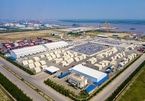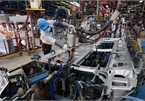 |
In addition, new points in the investment attraction policy look set to increase the attraction of foreign capital, especially from locations such as Japan.
Safe destination
The country’s successful control of the COVID-19 can be viewed as a good opportunity for Japanese investors, with Towa Industrial being a typical case in point.
Watanabe Yutaka, director of Towa Industrial Vietnam, says due to the COVID-19 and the urgent need to restructure supply chains, several factories of his firm operating in many countries were forced to halt production. “Instead, we have shifted to factories in Vietnam as the nation has successfully contained the disease. This is of great significance for investors," Yutaka emphasises.
While production costs in both Thailand and China are showing signs of an upward trend with saturated markets, the country is rapidly emerging as an attractive destination that features a more competitive investment environment.
In general, the situation regarding Japanese enterprises operating in the nation is nonetheless better than that of destinations which have been heavily affected by the COVID-19. According to a survey conducted by the Japan Trade Promotion Organization (JETRO) among 2,000 Japanese enterprises based in the country from June 18 to June 24, over 90% confirmed that they have suffered from the impact of the pandemic.
The common difficulty facing Japanese enterprises abroad during the COVID-19 pandemic has been capital arrangement, although their difficulties were partly reduced in Vietnam as a result of the epidemic being successfully brought under control.
According to Takeo Nakajima, chief representative of the JETRO in Hanoi, between 20% to 30% of Japanese business respondents indicate that their turnover recorded either zero or negative growth, while in the United States where the disease devastated the economy, the figure is three times higher at up to 60%.
Since 2018, plenty of Japanese enterprises have made moves to restructure their supply chains as a means of dispersing the risks of becoming dependent on the Chinese market. Indeed, 9% of Japanese companies surveyed state they are considering the possibility of shifting their facilities from the northern neighbour to Vietnam, while 4% of Japanese enterprises operating in countries outside of China confirm that they would consider investing in Vietnam.
Positive signs for FDI inflow into Vietnam
With the world economy and global foreign direct investment (FDI) suffering a decline, foreign investment into the nation is still recording positive developments. According to the Foreign Investment Agency under the Ministry of Planning and Investment, up to June 20, the total newly registered, adjusted, and contributed capital to buy shares of foreign investors in the nation reached US$15. 67 billion, equivalent to 84.9% over the same period last year.
Most notably, of approximately US$16 billion of total registered foreign capital in the country during the first half of the year, US$8.44 billion arrived from 1,418 newly registered projects, an increase of 13.8% from the same period last year.
Moreover, the first half of the year recorded 526 projects registered to adjust investment capital, with total additional registered capital at more than US$3.7 billion, representing an annual rise of 26.8%.
According to Deputy Minister of Planning and Investment Vu Dai Thang, in order to attract greater flows of foreign investment in the post-COVID-19 period, the nation will have to continue attracting investment in industrial and energy sectors, in addition to traditional industries. In particular, there is plenty of room for the country to develop bio-chemistry to be used in manufacturing pharmaceuticals and pharmaceutical products, one of the many areas where Japanese enterprises enjoy a lot of experience.
With regard to the Japanese side, before the initial COVID-19 broke out, several Japanese financiers had planned to move their production facilities out of China. As such, factors such as the US-China trade war and the COVID-19 can be viewed as "guarantors" of the country’s "intermediary" role within the global supply chain. If full advantage is taken of this "intermediary" position and opportunities are seized upon, FDI inflows into the country can run in contrast to the current situation regionally and globally, Thang says.
Sagara Hirohide, director of Marubeni Vietnam Company in Hanoi, says with the advantage of a long coastline and a developed seaport system, the nation will play a huge role in the international shipping system. This is a factor that Japanese investors will pay close attention to when taking into account their plans to expand supply chains.
“In such a role, as risks from the Chinese market increase, Vietnam's investment attraction will see an upward trend. Not only Japan, but for many other foreign investors that are also following the Vietnamese market,” Hirohide adds. VOV

Focusing on technology transfer in attracting new wave of FDI capital
As Vietnam is attracting high-quality foreign inflows, domestic firms now have an even greater opportunity to draw technology transfer to improve added value in its manufacturing industry.

What Vietnam needs to do to attract quality FDI after Covid-19
Speeding up infrastructure development and improving ease of doing business and vocational training are among things Vietnam can do to make itself more attractive to foreign investors post-Covid-19, according to VinaCapital.